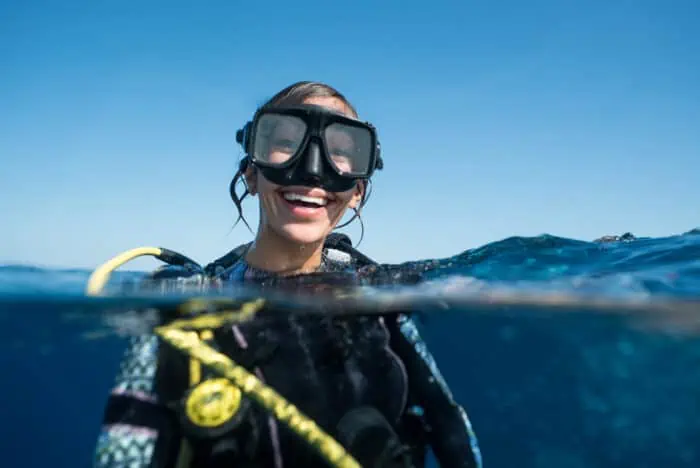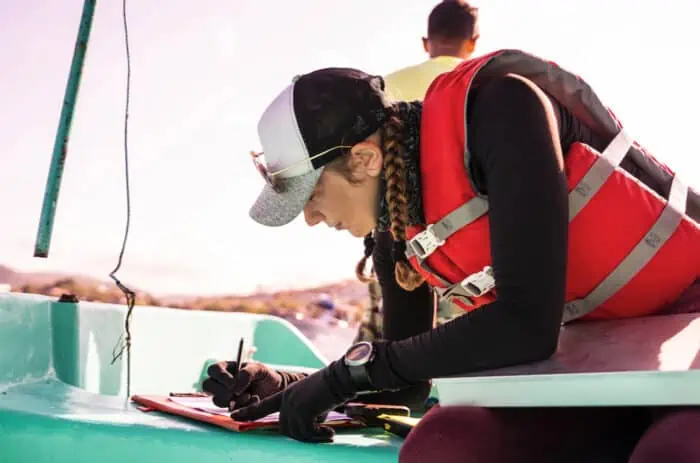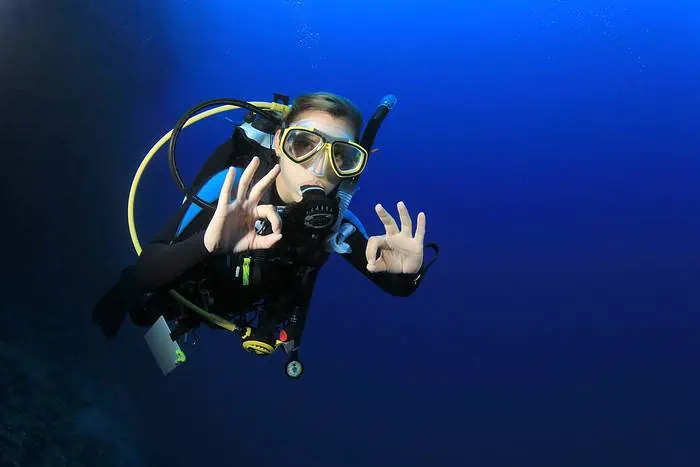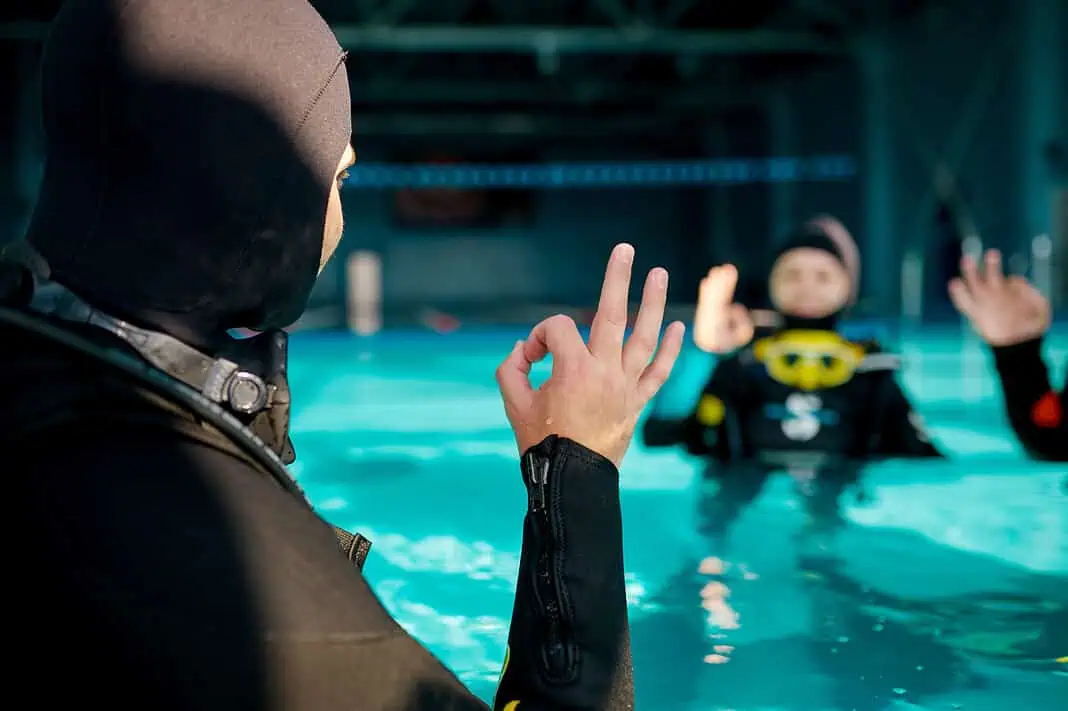If the idea of working in the diving industry has ever crossed your mind, you’re not alone. The diving industry holds an undeniable allure, beckoning adventurers and nature enthusiasts alike to explore the lifestyle that the diving industry offers.
Picture yourself diving daily as a job, surrounded by coral reefs and marine life. Imagine being part of groundbreaking research expeditions, uncovering ancient shipwrecks, or educating others about the importance of marine conservation.
The diving industry isn’t just about recreational diving—it’s a dynamic field encompassing various professions, from dive instructors and marine biologists to underwater photographers and dive resort managers.
What does my job look like?
I’m a scuba instructor, so I spend part of my week guiding certified divers to explore the beautiful reefs and wrecks here in Grenada or teaching an Open Water Course and educating the next generation of divers.
Additionally, I’m a content creator, so the other part of my week is spent generating creative ideas for social media and capturing content.
The one thing you’ll notice about the diving industry, regardless of your job role, is that no day, week, or month looks the same. That’s something that attracted me to the industry. I never get bored and always look forward to the next adventure.

That Sounds Great, But Where Do I Start?
Before diving headfirst into a career in the diving industry, you must equip yourself with the necessary knowledge and skills. Proper education and training ensure your safety underwater and lay the foundation for a successful career in diving.
Fortunately, numerous certification agencies offer comprehensive training programs for divers of all levels.
For aspiring dive professionals, obtaining certifications such as Divemaster or taking the Instructor Development Course (IDC) is a crucial step towards pursuing a dive instructor or dive resort manager career. These certifications validate your expertise as a diver and provide you with the necessary skills and qualifications to teach and guide others.
However, education and training in the diving industry go beyond just acquiring certifications. It’s about cultivating a mindset of continuous learning and improvement. Even seasoned professionals can benefit from advanced training courses, workshops, and seminars to enhance their skills and stay updated on industry trends and developments.
Where Should I Complete My Training?
Now that you understand the importance of education and training, the next step is to choose your starting point in the diving industry. One of the first decisions you’ll need to make is selecting a suitable diving location that aligns with your interests and goals.
Are you drawn to the vibrant coral reefs of tropical destinations like the Caribbean or Southeast Asia? Or perhaps you’re intrigued by the rugged coastlines and abundant marine life of colder waters like those in the Pacific Northwest or Northern Europe.
When researching potential diving locations, consider factors such as accessibility, water conditions, and the diversity of marine ecosystems.
You may also want to consider whether you would like to dive close to your home country or whether you’re seeking travel across the world.
Once you’ve chosen a location, the next step is to find a reputable dive center or resort with experienced instructors and comprehensive training facilities. Look for centers that prioritize safety, environmental stewardship, and quality instruction.
Research online reviews, ask for recommendations from fellow divers, and contact dive centers directly to learn more about their programs and offerings.
When selecting a certification agency, consider course curriculum, instructor quality, and industry recognition. While most agencies are widely recognized and respected worldwide, each may offer slightly different approaches to training and certification.
Choose an agency and course that best aligns with your learning style, career aspirations, and budget.

What Should I Expect Along The Way?
Once you’ve selected your starting point and enrolled in a diving course, it’s time to dive headfirst into the training process. Approach your training with enthusiasm, curiosity, and a willingness to learn.
The journey to becoming a certified diver is not just about mastering skills; it’s about immersing yourself in the industry and consistently building your knowledge.
Use classroom sessions, practical exercises, and open-water dives to build your underwater skills and confidence. Don’t hesitate to ask questions, seek clarification, and practice until you feel comfortable with each new concept and technique.
You’ll likely encounter challenges and setbacks as you progress through your training. Whether mastering a difficult skill or overcoming fear and apprehension, remember that it’s all part of the learning process. Be patient, trust your instructors, and stay focused on your goals.
Beyond the technical aspects of diving, training also provides valuable opportunities for personal growth and self-discovery. You’ll learn to trust your instincts, adapt to changing environments, and collaborate with others as part of a dive team.
These soft skills are essential for safe and enjoyable diving and can be transferred to various aspects of life and work.
What Career Options Are Available?
You’ll soon discover the diving industry offers many career options. The opportunities are as diverse as the marine ecosystems, from teaching diving courses and leading dive tours to conducting underwater research and conservation initiatives.
Becoming a certified dive instructor is one of the most common career paths in the diving industry. As a dive instructor, you can share your passion for diving with others, teaching beginner and advanced courses, guiding dive excursions, and helping students develop their skills and confidence underwater.
It’s a rewarding profession that allows you to inspire others while exploring the underwater world.
For those passionate about marine conservation and environmental stewardship, careers in marine biology, conservation science, and underwater photography offer exciting opportunities to impact our oceans’ health and vitality positively.
Whether researching coral reef ecosystems, studying marine biodiversity, or documenting underwater habitats through photography and videography, these careers allow you to combine your love for diving with your commitment to conservation.
If you’re more drawn to the technical aspects of diving, careers in dive equipment maintenance and repair, commercial diving, and underwater welding offer opportunities to apply your skills in various settings.
Whether servicing dive equipment, conducting underwater inspections, or performing maintenance on offshore structures, these careers require specialized training and expertise but offer the thrill of working in unique and challenging environments.
Beyond these traditional career paths, the diving industry also offers opportunities in dive tourism, dive resort management, dive retail and sales, and dive travel planning.
Whether you’re interested in working at a tropical dive resort, managing a dive shop, or organizing dive expeditions around the world, there’s a niche within the industry that’s perfect for you.
In essence, the diving industry is a diverse and dynamic field that offers something for everyone. Whether you’re passionate about teaching, conservation, exploration, or adventure, there’s a career in diving that allows you to pursue your interests while positively impacting the world around you.

Qualities and Skills Desired by the Diving Industry
In the competitive world of the diving industry, employers look for individuals with a combination of technical skills, interpersonal qualities, and a genuine passion for the ocean. While specific requirements may vary depending on the role and employer, several qualities and skills are universally valued within the industry.
First and foremost, a strong foundation of diving skills and knowledge is essential for many positions within the industry. Employers expect you to demonstrate proficiency in various areas, whether you’re applying for a dive instructor role, a marine biologist position, or another position.
Employers look for individuals who possess excellent communication and interpersonal skills in addition to technical skills. Whether you’re leading a dive group, conducting research underwater, or interacting with guests at a dive resort, communicating clearly and effectively is essential.
Strong leadership skills, adaptability, and the ability to work well as part of a team are also highly valued traits within the industry.
Employers also look for a passion for the ocean and a commitment to environmental stewardship when hiring individuals in the diving industry. Whether you’re teaching others about marine conservation, conducting research on coral reef ecosystems, or leading dive tours in ecologically sensitive areas, a genuine love for the ocean and a desire to protect it for future generations are essential qualities that employers value.
Finally, flexibility, resilience, and a willingness to adapt to changing environments and circumstances are important qualities for individuals working in the diving industry.
As mentioned earlier, no day is the same in the industry, regardless of your role. Whether you’re facing challenging diving conditions, logistical hurdles, or unexpected changes to dive plans, remaining calm, flexible, and resourceful in the face of adversity is crucial.
Final Thoughts
In closing, the diving industry offers possibilities for those eager to explore and make a difference. Whether you’re drawn to teaching, research, conservation, or adventure, there’s a niche waiting for you.
Investing in education, essential skills, and following your passion can turn your love for the ocean into a fulfilling career.

